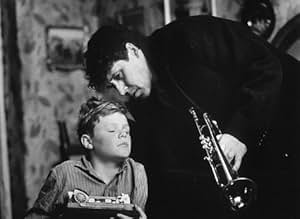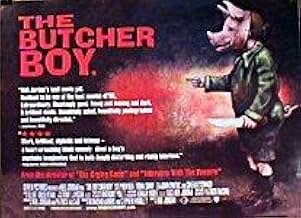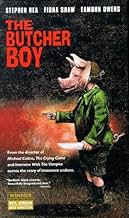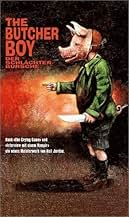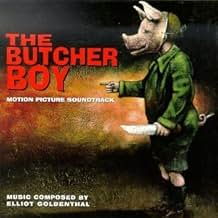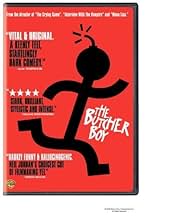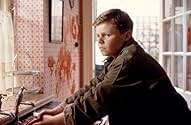IMDb RATING
7.1/10
12K
YOUR RATING
The antisocial son of an alcoholic father and a bipolar mother grows up in 1960s Ireland.The antisocial son of an alcoholic father and a bipolar mother grows up in 1960s Ireland.The antisocial son of an alcoholic father and a bipolar mother grows up in 1960s Ireland.
- Awards
- 10 wins & 11 nominations total
Featured reviews
This film is as shocking and horrific as it was funny and touching. In a world of many heartless films that are shallow, annoying, and predictable or insensitive and too dramatic, this movie balanced all it's elements wonderfully. It's a tale of Francie Brady, a young Irish lad in the early Cold War, who at first has a lot of playful mischief and a deep heart for those closest to him. Yet as the film progresses so does the Francie's problems and so does the darkness within him as he tries to hold on and protect what little he was born with. His drunken father, who has a great knack with the trumpet, loves his family but his pain seems to override his tenderness. His mother is caught in the struggle of being a good mother and fighting her own inner demons, which ultimately consumes her. Francie invests much of his faith into his best friend Joe, a calmer but good-humored boy. But even the deepest of friendships suffer from the pressure of society, as Joe abandons Francie for a more conforming lifestyle. As all of Francie's allies leave him, insanity and anger take over his mind. He plunges into a life a wild and frantic searching and destruction. He takes out much of this anger on a critical and harsh neighbor, in a gruesome scene (which is funny considering how it differs from most of the Hollywood bull). Francie's escapades lead him to hospitalization. We then meet the adult Francie years later as he is released. We see the eager boy who grew into a lunatic and now has settled into a state of sad yet conventional behavior, but a good old friend (which was once a part of his insanity) comes back to comfort him. This film may be eerie and unconventional but that is what adds to it brilliance and fantastical charm. Viewer Note: I'll never look at a pile of cabbage the same way again
Neil Jordan, famed for such hits as Michael Collins and The Crying Game, returns to a much more conventional style of filmmaking. This time he leaves out the stars: no Liam Neeson, no Aidan Quinn, no Julia Roberts. This time it's cinema verite: a sotto-voce cast (barring Stephen Rea) which takes the mind off the actors and onto the film.
Which is good, because the film is a ripsnorter. It's a powerful expose on how children can turn out horribly wrong through a tough childhood. There is no fancy cinematography or cutesy-pie moments; no Hollywood endings or Schwarzenegger stick-ups. This is pure black comedy which relies on a fabulous script.
It revolves around the life of Francie Brady, a young Irish boy who gets up to all sorts of mischief. Him and his friend, Joe, are the local troublemakers in Dublin. But, there's more to Francie than one would think. His is a soul which is black at the core, and the passing of prominent figures in his life, as well as time spent in and out of juvenile detention centres, plus the dirty priests which govern the schools, sends the boy over the edge.
He paints a picture of hyperbole. Francie always seems happy, energetic and ready for action, yet boiling up inside of him are bloody demons and unimaginable violence. It's that hyperbole which creates so much tension in the movie, just wondering what he'll do and when he'll do it.
The film is narrated by an older Francie, one who has spent his life in a prison for the mentally insane. His narration is humorous and ironic, yet occasionally it derives some of the power from the movie because of its light-hearted, schmultzy comments. Francie sometimes talks to his older self, making one remember "Ferris Beuler's Day Off", but apart from that, the film is fantastic.
It lags in parts. Occasional scenes are drawn out and lengthy, and you just want to scream out, "pick up the damn butcher's knife and kill someone!" To make the film increase in pace. But that's not a major problem, that might just be my attention span, if you didn't have those scenes you wouldn't have such a poignant movie.
The Butcher Boy has a very satisfactory denouement. We all took our childhood for granted. It had its ups, it had its downs. This is a film which portrays what sort of childhood arises from continuous downs, dominated by misery and loss, and how much of an effect it can have on such an impressionable mind. This is a wonderful, black, violent, dramatic and hilarious movie. A rare offering, indeed.
Nine out of ten.
Which is good, because the film is a ripsnorter. It's a powerful expose on how children can turn out horribly wrong through a tough childhood. There is no fancy cinematography or cutesy-pie moments; no Hollywood endings or Schwarzenegger stick-ups. This is pure black comedy which relies on a fabulous script.
It revolves around the life of Francie Brady, a young Irish boy who gets up to all sorts of mischief. Him and his friend, Joe, are the local troublemakers in Dublin. But, there's more to Francie than one would think. His is a soul which is black at the core, and the passing of prominent figures in his life, as well as time spent in and out of juvenile detention centres, plus the dirty priests which govern the schools, sends the boy over the edge.
He paints a picture of hyperbole. Francie always seems happy, energetic and ready for action, yet boiling up inside of him are bloody demons and unimaginable violence. It's that hyperbole which creates so much tension in the movie, just wondering what he'll do and when he'll do it.
The film is narrated by an older Francie, one who has spent his life in a prison for the mentally insane. His narration is humorous and ironic, yet occasionally it derives some of the power from the movie because of its light-hearted, schmultzy comments. Francie sometimes talks to his older self, making one remember "Ferris Beuler's Day Off", but apart from that, the film is fantastic.
It lags in parts. Occasional scenes are drawn out and lengthy, and you just want to scream out, "pick up the damn butcher's knife and kill someone!" To make the film increase in pace. But that's not a major problem, that might just be my attention span, if you didn't have those scenes you wouldn't have such a poignant movie.
The Butcher Boy has a very satisfactory denouement. We all took our childhood for granted. It had its ups, it had its downs. This is a film which portrays what sort of childhood arises from continuous downs, dominated by misery and loss, and how much of an effect it can have on such an impressionable mind. This is a wonderful, black, violent, dramatic and hilarious movie. A rare offering, indeed.
Nine out of ten.
The Butcher Boy is exuberant, funny and horrific. It's passionate and inventive and unforgettable. The Butcher Boy was directed by Irishman Neil Jordan who's previous films are impressive. They include The Crying Game, Mona Lisa, Interview With A Vampire, and Michael Collins.
The Butcher Boy is based on a novel by Patrick McCabe who also co-wrote the screen play. I'm very pleased to relate that The Butcher Boy isn't based on a true story!!! I sure hope it isn't anyway.
The Butcher Boy is about a lad who commits a horrific murder in a rural Irish town. But the film certainly isn't solemn. Jordan has enlivened an essentially gory tale with a touch of inventive, sometimes humorous magic realism (a bewigged Sinead O'Connor plays The Virgin Mary). Jordan is also blessed by having available a wonderfully gifted leading actor.
Fifteen year old Eamonn Owens, a schoolboy in real life from near where The Butcher Boy was shot, plays 12 year old Francie Brady. Francie finds himself betrayed. His dad (Stephen Rea) is a drunk, his Ma (Aisling O'Sullivan) is suicidal. His best friend lets him down. The township and it's institutions aren't supportive. He eventually takes his revenge.
The boy also has visions. We could say he's imaginative as children should be, but this boy is cheerfully violent as well. The Butcher Boy doesn't discuss cause and effect at all, but such is the power of the film, most viewers will wonder how such a thing could happen. Was Francie schizophrenic? Was he a psychopath. If he had had a stable loving family what might have happened?
Regardless, Eamonn Owens is just terrific as the cheerful, energetic, often very funny Francie Brady. This red headed bundle of uninhibited, unselfconscious energy has created a very memorable screen character indeed. Neil Jordan must have been tickled pink to have such a lead for his film.
Leading English stage actress Fiona Shaw plays the prissy Mrs Nugent and Irish stalwart, Milo (the eyebrows) O'Shea plays a meddlesome priest. Stephen Rea fans won't find much to celebrate since Rea doesn't do much more than look drunk, sit, and kick in a television, but that's because The Butcher Boy quite rightly revolves around the wonderful, funny and bloody Eamonn Owens. See The Butcher Boy if you can.
The Butcher Boy is based on a novel by Patrick McCabe who also co-wrote the screen play. I'm very pleased to relate that The Butcher Boy isn't based on a true story!!! I sure hope it isn't anyway.
The Butcher Boy is about a lad who commits a horrific murder in a rural Irish town. But the film certainly isn't solemn. Jordan has enlivened an essentially gory tale with a touch of inventive, sometimes humorous magic realism (a bewigged Sinead O'Connor plays The Virgin Mary). Jordan is also blessed by having available a wonderfully gifted leading actor.
Fifteen year old Eamonn Owens, a schoolboy in real life from near where The Butcher Boy was shot, plays 12 year old Francie Brady. Francie finds himself betrayed. His dad (Stephen Rea) is a drunk, his Ma (Aisling O'Sullivan) is suicidal. His best friend lets him down. The township and it's institutions aren't supportive. He eventually takes his revenge.
The boy also has visions. We could say he's imaginative as children should be, but this boy is cheerfully violent as well. The Butcher Boy doesn't discuss cause and effect at all, but such is the power of the film, most viewers will wonder how such a thing could happen. Was Francie schizophrenic? Was he a psychopath. If he had had a stable loving family what might have happened?
Regardless, Eamonn Owens is just terrific as the cheerful, energetic, often very funny Francie Brady. This red headed bundle of uninhibited, unselfconscious energy has created a very memorable screen character indeed. Neil Jordan must have been tickled pink to have such a lead for his film.
Leading English stage actress Fiona Shaw plays the prissy Mrs Nugent and Irish stalwart, Milo (the eyebrows) O'Shea plays a meddlesome priest. Stephen Rea fans won't find much to celebrate since Rea doesn't do much more than look drunk, sit, and kick in a television, but that's because The Butcher Boy quite rightly revolves around the wonderful, funny and bloody Eamonn Owens. See The Butcher Boy if you can.
Just caught this movie on cable; I hadn't heard of it before.
It is a brilliant film; black comedy of the blackest sort. What is truly amazing is the acting ability of lead Eamonn Owens; in my mind the finest performance of a kid his age that I've ever seen.
The sardonic humor of this film, the way it treats such horrible things as lightly as it does, the acting, the script, the quaint narrative devices, and sense of menace cloaked in charming small town Irish life make this a thoroughly original and engaging character study.
Sinead O'Connor is a scream as the Virgin Mary.
The thick accents in this film make it a little bit difficult to follow in parts, but American audiences should still be able to understand most of the dialogue.
I cannot recommend this film highly enough; it is proof that you can still make a quality movie without buying into cheap Hollywood cliches.
It is a brilliant film; black comedy of the blackest sort. What is truly amazing is the acting ability of lead Eamonn Owens; in my mind the finest performance of a kid his age that I've ever seen.
The sardonic humor of this film, the way it treats such horrible things as lightly as it does, the acting, the script, the quaint narrative devices, and sense of menace cloaked in charming small town Irish life make this a thoroughly original and engaging character study.
Sinead O'Connor is a scream as the Virgin Mary.
The thick accents in this film make it a little bit difficult to follow in parts, but American audiences should still be able to understand most of the dialogue.
I cannot recommend this film highly enough; it is proof that you can still make a quality movie without buying into cheap Hollywood cliches.
THE BUTCHER BOY comically chronicles a young boy's descent into madness. The boy provides a voice-over from the present to tell the story of his youth in an Irish village in the early 60s. His father's a violent drunk, and his mother is already insane, so it's not difficult to explain why the kid is losing his mind. It's just that he really doesn't know he's going crazy. He believes he's leading a perfectly normal life as we watch in horror as his actions grow more violent and frightening. And it's a comedy!
Neil Jordan is a craftsman and creates a very enjoyable movie even given the very dark subject matter. The child actor's are great, the best I've seen this side of PONETTE. If the subject and its treatment don't put you off you will like this movie. If not, try something else.
Neil Jordan is a craftsman and creates a very enjoyable movie even given the very dark subject matter. The child actor's are great, the best I've seen this side of PONETTE. If the subject and its treatment don't put you off you will like this movie. If not, try something else.
Did you know
- TriviaStephen Rea is credited as only playing Pa in the film, but he also plays the adult Francie, who narrates his story in voice-overs throughout the film, uncredited.
- SoundtracksMack the Knife
Written by Kurt Weill / Bertolt Brecht
European American Music Corp. / Warner / Chappell Music, Inc. / Universal Edition A.G.
Performed by Santo & Johnny
Courtesy of BMG Entertainment International UK & IRL Ltd.
- How long is The Butcher Boy?Powered by Alexa
Details
Box office
- Gross US & Canada
- $1,995,911
- Opening weekend US & Canada
- $135,606
- Apr 5, 1998
- Gross worldwide
- $1,995,911
Contribute to this page
Suggest an edit or add missing content


